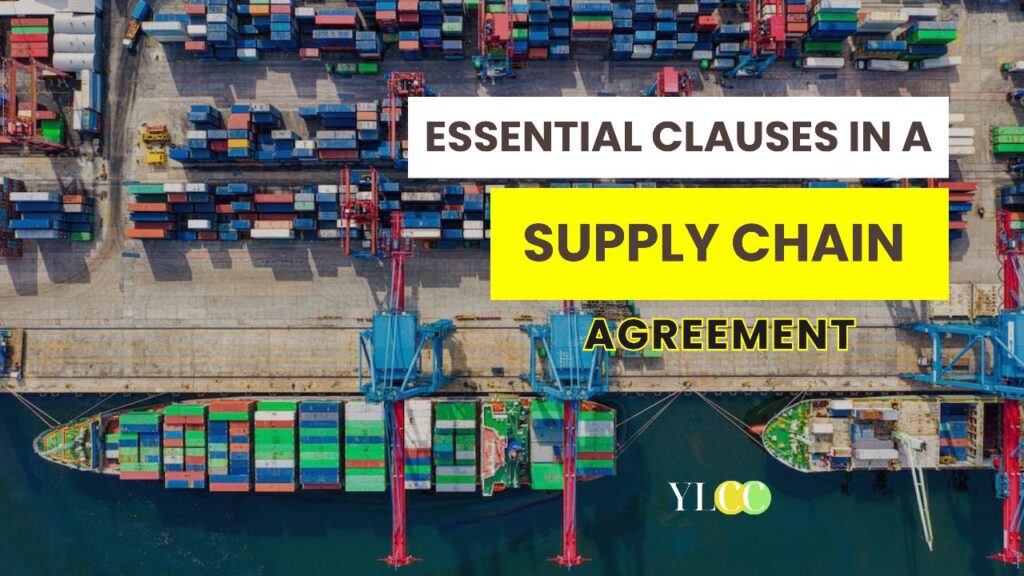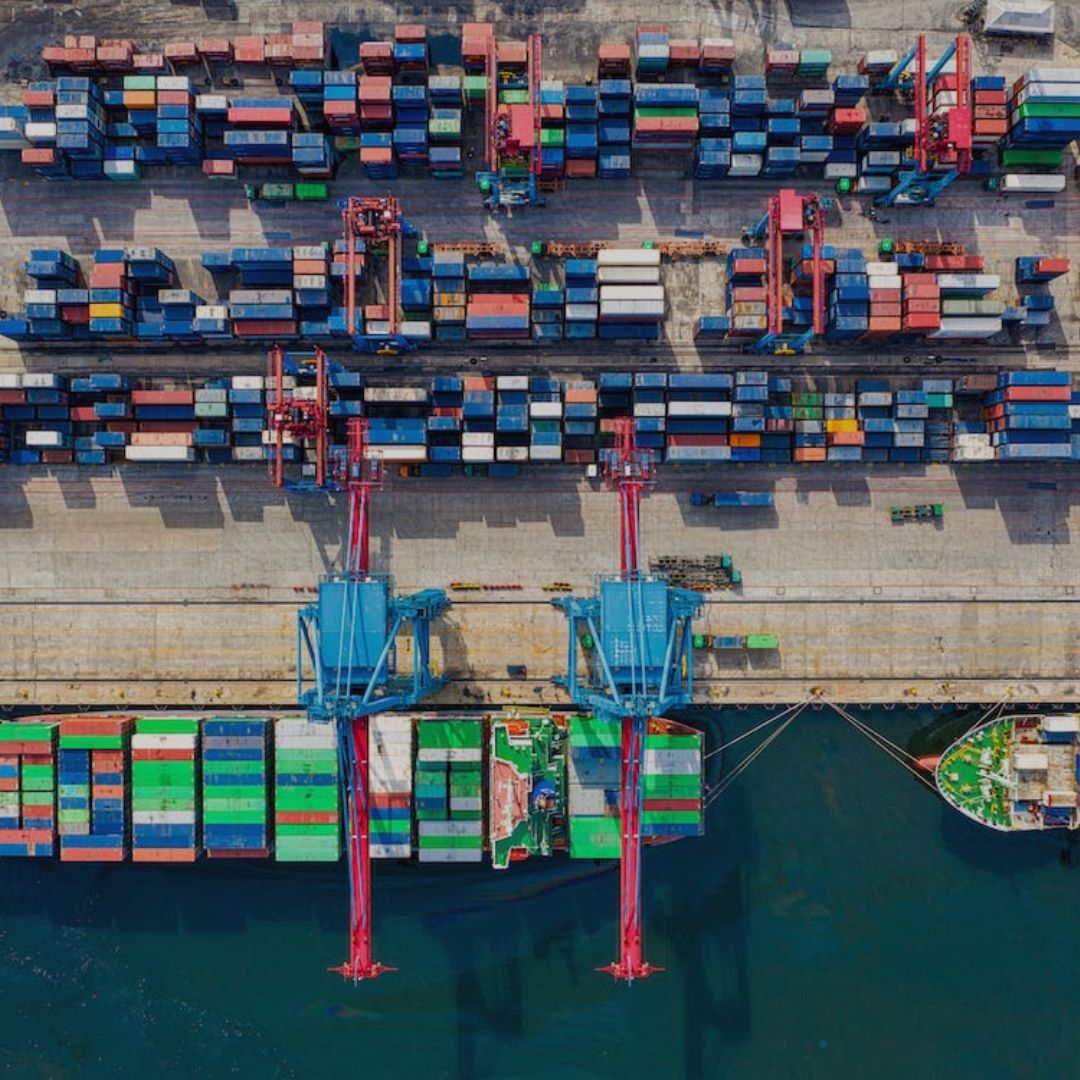
INTRODUCTION
Supply Chain Agreements are an integral part of a company’s operations as they outline the terms and conditions governing the procurement of goods and services required for the business.
These contracts are legally binding and provide a framework for the relationship between a company and its suppliers. Failure to scrutinize these contracts can lead to several issues that can negatively impact a company’s operations, such as delivery delays, quality issues, price discrepancies, and legal disputes. It is important to use clear language to avoid any confusion in understanding the complexities of a supply chain agreement.
To ensure the legality of supply chain contracts and avoid potential risks, it is recommended to seek legal advice from a qualified Supply Chain Lawyer. The legal professionals have the expertise to assess the terms of the contract, identify any potential legal issues, and ensure that the contract is in compliance with all relevant laws and regulations. They can also provide guidance on contract negotiation and dispute resolution, which can help prevent potential conflicts from arising.
In a Supply Chain Agreement, there are certain expectations that both parties should have. The agreement should clearly outline the scope of work, which includes the goods or services to be provided, delivery timelines, and acceptance criteria. It should include pricing and payment terms, as well as any warranties or guarantees that the supplier is providing.
The agreement should address issues related to changes in the scope of work or pricing, as well as termination or default by either party. In addition, the agreement should address issues related to intellectual property ownership, confidentiality, and dispute resolution. Thus, by having a well-drafted and comprehensive Supply Chain Agreement, both parties can have a clear understanding of their obligations and expectations and can minimize the risk of disputes or other issues arising during the course of the relationship.
THE ESSENTIAL CLAUSES
Every Supply Chain Agreement is customized to meet the particular requirements, challenges, and business objectives of the parties involved. This can include factors such as the nature of the products or services being supplied, the geographical location of the parties, and the regulatory environment in which they operate.
However, despite the unique nature of these contracts, there are several key provisions that are typically included in most supply chain agreements. These provisions aim to ensure that both parties’ rights and obligations are clearly defined and that potential risks and disputes are anticipated and addressed upfront. By including these key provisions in a supply chain contract, the parties can establish a solid framework for collaboration, minimize the likelihood of disputes or disruptions, and help to ensure the smooth functioning of the supply chain.
Confidentiality and Know-How Clause
This clause is an essential provision in supply chain agreements. This clause aims to protect the confidential information and trade secrets of the parties involved in the agreement. This provision ensures that the information exchanged between the parties is kept confidential and is not disclosed to third parties without the proper authorization.
Key points to remember in this clause:
- Clearly define what constitutes confidential information and trade secrets. This can include but is not limited to, technical data, financial information, customer lists, and marketing strategies.
- Specify the limitations on the use of confidential information. This includes how the information can be used, who can use it, and for what purposes.
- Outline the steps that must be taken to protect confidential information, including how it should be stored and transmitted.
- Include provisions on how to handle breaches of confidentiality, including remedies and damages in case of any unauthorized disclosure of confidential information.
- Clearly define the duration of the confidentiality obligations, including when the information is no longer considered confidential.
Allocation of Risk Clause
Risk allocation is a critical component of supply chain agreements. It involves identifying the potential risks and liabilities that may arise during the performance of the agreement and allocating those risks and liabilities to the appropriate party. The objective is to establish a fair and balanced distribution of risks and responsibilities between the parties involved in the supply chain while ensuring that the agreement is mutually beneficial.
Key points to remember in this clause:
- This clause should clearly identify the types of risks involved in the performance of the agreement, such as delivery delays, quality issues, compliance issues, and force majeure events.
- This clause should allocate the identified risks to the appropriate party, taking into account the party’s ability to control or mitigate the risk.
- The clause should specify the indemnification obligations of each party in case of any loss or damage arising from the allocated risk.
- The clause should specify the insurance requirements of each party, including the types and minimum limits of insurance coverage required.
- The clause should specify the maximum liability of each party for any damages arising from the performance of the agreement. However, it’s important to note that limitation of liability clauses may not always be enforceable, depending on the jurisdiction and the circumstances of the case. Therefore, it’s important to consult with the concerned lawyer to ensure that the limitation of liability clause is appropriately drafted and legally enforceable.
Product Specifications and Quality Control Clause
This clause in a Supply Chain Agreement is important to ensure that the materials provided meet the standards and specifications required by the buyer. This clause provides a clear understanding of what is expected from the supplier in terms of the quality of the materials or goods they are providing.
Some key points to remember when including this clause:
- Clearly define the quality standards that the supplier must adhere to when providing materials or goods.
- Include detailed specifications for the materials or goods, including any particular requirements or testing standards.
- The supplier should be required to have quality control measures in place to ensure that the materials or goods meet the agreed-upon standards.
- The buyer should have the right to inspect the materials or goods to ensure that they meet the required standards before accepting delivery.
- The buyer should also have the right to reject any materials or goods that do not meet the required standards, and the supplier should be required to provide replacement materials or goods that do meet the required standards.
- Specify the consequences if the supplier fails to meet the agreed-upon quality standards, including any penalties or termination of the agreement.
Financial Terms Clause
This is a critical clause in any supply chain agreement, as it outlines the payment terms and pricing structure for the goods or services being provided. This clause typically includes provisions on payment timelines, payment methods, currency of payment, and pricing mechanisms.
The key points to remember:
- Use clear and specific language in this clause to avoid any ambiguity or confusion. It is essential to clearly outline the payment terms, such as when payments are due, how they will be made, and any penalties or interest for late payments.
- The pricing structure should be transparent and include any details on how pricing will be calculated, such as through fixed pricing or variable pricing based on market conditions.
- This clause may also include provisions for adjustments to pricing, such as due to changes in market conditions or raw material costs. For example, a supply chain agreement for the purchase of raw materials may include a pricing mechanism that adjusts the price based on fluctuations in the market price of the raw materials.
- It is important to consider the impact of payment and pricing on the overall supply chain relationship. Negotiating fair and reasonable terms for both parties can help establish a strong and positive working relationship, while unreasonable payment or pricing terms can lead to disputes and potentially damage the business relationship.
Subcontracting Clause
This clause in a supply chain agreement allows the contracting party to delegate some or all of their obligations to a third-party subcontractor. It is especially important for suppliers who may not have the necessary resources or expertise to fulfill their obligations under the agreement.
Key points to remember:
- It is important to clearly outline the terms and conditions of subcontracting in the agreement, including the process for selecting and approving subcontractors, the responsibilities of the subcontractor, and any limitations on subcontracting. For example, the agreement may require the supplier to obtain the written consent of the other party before subcontracting any obligations or may limit the supplier to subcontracting only certain aspects of the supply chain process.
- This should also address liability and indemnification issues, such as whether the subcontractor will be held liable for any breaches of the agreement by the supplier, and whether the subcontractor will be required to indemnify the other party for any losses resulting from the subcontractor’s actions.
- The clause should specify whether or not subcontracting is allowed, and if it is allowed, under what conditions.
- The clause should outline the steps that the supplier must take to ensure that any subcontractors meet the same quality, safety, and compliance standards that the supplier is held to under the agreement.
- The supplier should be required to obtain the buyer’s written approval before subcontracting any part of the work.
- The buyer may also require the supplier to disclose the identity of any proposed subcontractors, along with detailed information about their qualifications, experience, and ability to perform the work.
- If the supplier breaches the subcontracting provisions, the buyer may be entitled to terminate the agreement, seek damages, or both.
Other essential clauses:
- Anti-counterfeiting Measures ( this will include protection of the IP).
- Term and Termination.
- Obligation of the parties.
- Representation and Warranties.
CONCLUSION
A well-written and comprehensive Supply Chain Agreement is critical to ensuring the smooth operation of a business. It is important to carefully consider and include key provisions such as those related to risk allocation, protection of confidential information, materials and quality requirements, payment and pricing, and subcontracting. Additionally, protecting intellectual property from counterfeits and ensuring compliance with relevant laws and regulations are also essential components of a robust supply chain agreement. By consulting with experienced legal professionals and conducting extensive due diligence, companies can minimize the risks and maximize the benefits of their supply chain agreements.
Disclaimer: This article is for information purposes only. You are advised to consult a legal professional for drafting such crucial documents for your business.
This article has been written by Team Your Legal Career Coach (YLCC), for queries, please write to us at: queries.ylcc@gmail.com






